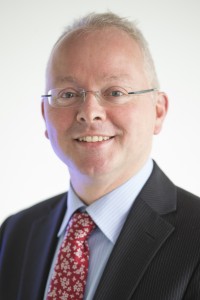Prof. Albert Heck, Ph.D.
Professor and Director of Proteomics Center of Netherlands
University of Utrecht, The Netherlands
A multi-angular view at protein phosphorylation by mass spectrometry
Phosphorylation of proteins directly influences their activity, conformation, localization, oligomeric state and/or binding to interaction partners. Due to this wide range of outcomes, diverse and multidimensional analyses are required to fully monitor and understand the structural and functional consequences of a protein phosphorylation event. Preferably, such assays should follow both auto- and substrate-phosphorylation, and thus monitor the substrate and the kinase simultaneously. Presently, protein phosphorylation is often investigated at unconnected levels.
First, at the protein sequence level phosphoproteomics data can be gathered on site-specific phosphorylation, the sequence motifs recognized by a kinase and possible cross-talk between different modified sites. Secondly, kinetic biochemical analysis can provide data on the reaction rates of each enzyme-substrate pair, requirements of co-factors or certain environmental conditions for kinase activation, deactivation and inhibition. Thirdly, a range of structural effects of the phosphorylation event can be interrogated, for example changes in conformation, oligomeric state, protein complex formation or dissociation by using structural biology methods such as NMR, X-ray crystallography and electron microscopy.
In this lecture I will describe various (new) ways in which mass spectrometry can be of help to study these different aspects of protein phosphorylation, thereby focusing on new enrichment methods, proteases, and fragmentation techniques of use for shot-gun phosphoproteomics. Additionally, I will describe top-down proteomics, and native mass spectrometry based technologies and how they can be used in direct reaction monitoring by mass spectrometry of structural and functional aspects of enzyme/substrate relationships.
Biosketch
Albert J.R. Heck (1964) is professor at the Science Faculty of Utrecht University. He is scientific coordinator of the Netherlands Proteomics Centre and the European large-scale proteomics infrastructure PRIME-XS. A large emphasis of Heck’s group is on the development and applications of advanced mass spectrometry based proteomics technologies. A specific highlight in this area involves the development of new methods to enrich a complex mixture of proteins/peptides for specific post-translational modifications. Heck introduced in 2004 enrichment of phosphopeptides using TiO2 material. The Heck-lab also introduced the use of a protease named LysN that in conjunction with ETD provides unique sequence ladders that are straightforward to interpret and allow facile de novo sequencing and improve the analysis of protein phosphorylation. More recently we introduced for large-scale proteomics a simple and cost-effective stable isotope labeling by using reductive dimethylation, and an effective combination of the peptide fragmentation methods HCD and ETD termed EThcD.
Heck’s proteomics research focuses for a large part on (embryonic and adult) stem cells and immunology. Most of these studies are aimed at the understanding of embryonic, adult an induced pluripotents stem cell differentiation, which may eventually lead to these cells being used for regenerative purposes. Complementary to the proteomics efforts, the group of Albert Heck is also known for its specific expertise in the mass spectrometric analysis of intact proteins and protein complexes. They developed therefore unique and dedicated instruments, with most recently a new modified Orbitrap that can be considered a serious breakthrough for top-down proteomics. Research in native mass spectrometry focuses on virus assembly, therapeutic antibodies, transcription complexes and CRISPR related protein assemblies.
Heck’s is council member of Human Proteome Organization (HUPO) and was chair of the HUPO Conference in Amsterdam in 2008. He received the Gold Medal of the Dutch Royal Chemical Society in 2001, the Descartes-Huygens Award in 2007, the Life Science Award of the German Mass Spectrometry Society in 2010, the HUPO Discovery Award in 2013 and the Pioneer in Proteomics Award of EuPA in 2014. In 2014 he was elected member of EMBO and the Royal Netherlands Academy of Sciences (KNAW). He received in 2010 a Guest professor-ship in Systems Biology at the ETH Zurich, and was a visiting scientist at The Scripps Research Institute, in 2011.
Date
Date(s) - May 26, 2015
7:00 pm - 10:00 pm
Emplacement / Location
Morris and Rosalind Goodman Agora

